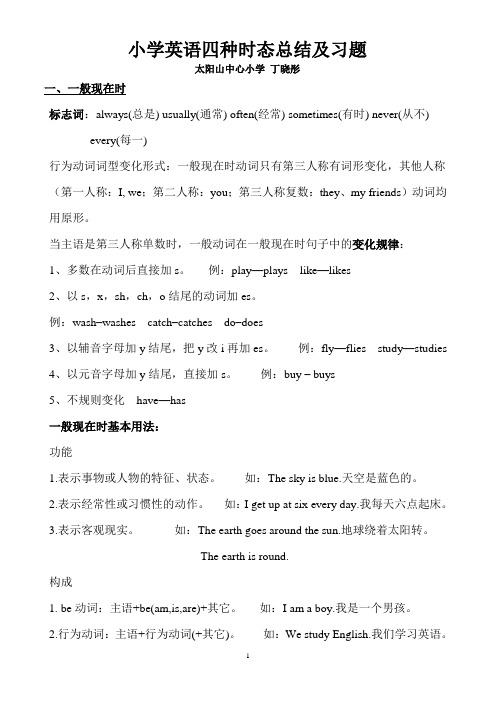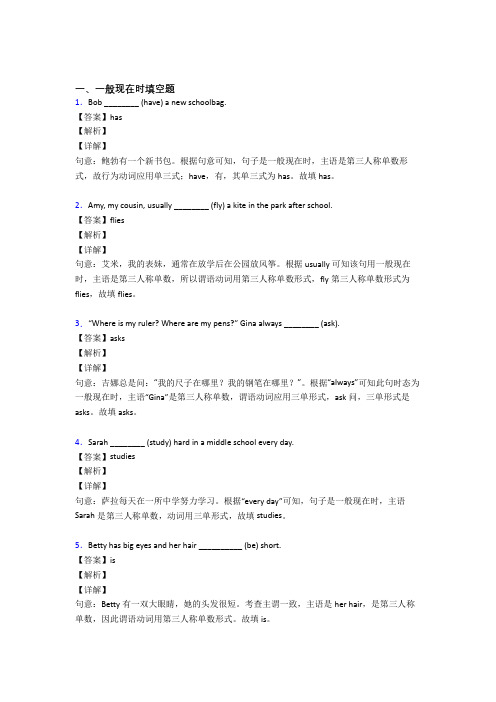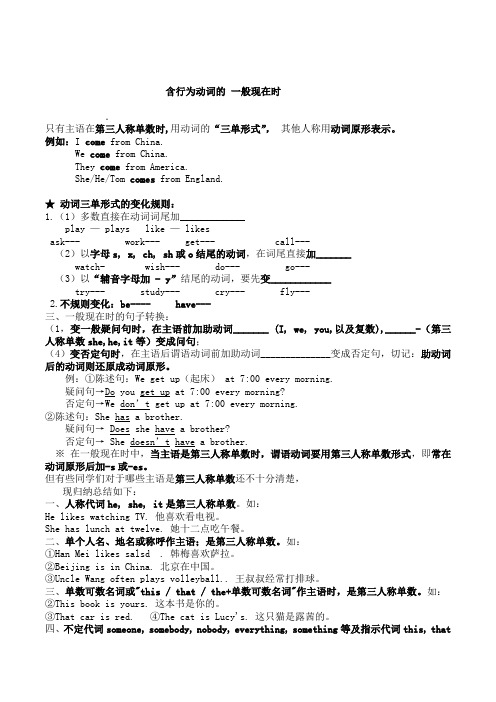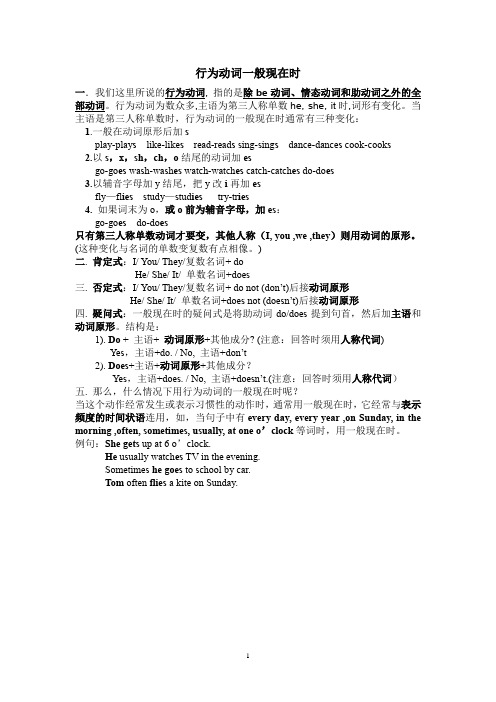行为动词的一般现在时练习题
(完整版)小学英语四种时态练习题丁晓彤

小学英语四种时态总结及习题太阳山中心小学丁晓彤一、一般现在时标志词:always(总是) usually(通常) often(经常) sometimes(有时) never(从不) every(每一)行为动词词型变化形式:一般现在时动词只有第三人称有词形变化,其他人称(第一人称:I, we;第二人称:you;第三人称复数:they、my friends)动词均用原形。
当主语是第三人称单数时,一般动词在一般现在时句子中的变化规律:1、多数在动词后直接加s。
例:play—plays like—likes2、以s,x,sh,ch,o结尾的动词加es。
例:wash–washes catch–catches do–does3、以辅音字母加y结尾,把y改i再加es。
例:fly—flies study—studies4、以元音字母加y结尾,直接加s。
例:buy – buys5、不规则变化have—has一般现在时基本用法:功能1.表示事物或人物的特征、状态。
如:The sky is blue.天空是蓝色的。
2.表示经常性或习惯性的动作。
如:I get up at six every day.我每天六点起床。
3.表示客观现实。
如:The earth goes around the sun.地球绕着太阳转。
The earth is round.构成1. be动词:主语+be(am,is,are)+其它。
如:I am a boy.我是一个男孩。
2.行为动词:主语+行为动词(+其它)。
如:We study English.我们学习英语。
句型肯定句:A. be动词:主语+ be + 其它成分如:He is a worker.B.行为动词:主语+动词(注意人称变化) +其它成分如:We like the little cat.否定句:A. be动词:主语+ be + not +其它成分如:They are not students.B.行为动词:主语+助动词(do/does) + not +动词原形+其它成分如:We don’t like the little cat.一般疑问句:A. be动词:Am / Is /Are +主语+ 其它成分如:Are you a teacher? Yes, I am. / No, I am not.Are they students of your school?Yes they are / No they aren’t.B.行为动词:助动词(Do/Does)+主语+动词原形+ 其它成分如:Do you like it? Yes, I do. / No. I don’t .Does he(she) like it? Yes, he( she )does. / No, he ( s he )doesn’t.特殊疑问句:疑问词+ 一般疑问句A. be动词:How many students are there in your school?B.行为动词:What do you usually do on Sunday?一般现在时动词be和have的变化形式1.动词Be 用法:第一人称单数用am,第三人称单数用is,其它人称用are。
(完整版)一般现在时练习题附答案解析

一、一般现在时填空题1.Bob ________ (have) a new schoolbag.【答案】has【解析】【详解】句意:鲍勃有一个新书包。
根据句意可知,句子是一般现在时,主语是第三人称单数形式,故行为动词应用单三式;have,有,其单三式为has。
故填has。
2.Amy, my cousin, usually ________ (fly) a kite in the park after school.【答案】flies【解析】【详解】句意:艾米,我的表妹,通常在放学后在公园放风筝。
根据usually可知该句用一般现在时,主语是第三人称单数,所以谓语动词用第三人称单数形式,fly第三人称单数形式为flies,故填flies。
3.“Where is my ruler? Where are my pens?” Gina always ________ (ask).【答案】asks【解析】【详解】句意:吉娜总是问:“我的尺子在哪里?我的钢笔在哪里?”。
根据“always”可知此句时态为一般现在时,主语“Gina”是第三人称单数,谓语动词应用三单形式,ask问,三单形式是asks。
故填asks。
4.Sarah ________ (study) hard in a middle school every day.【答案】studies【解析】【详解】句意:萨拉每天在一所中学努力学习。
根据“every day”可知,句子是一般现在时,主语Sarah是第三人称单数,动词用三单形式,故填studies。
5.Betty has big eyes and her hair __________ (be) short.【答案】is【解析】【详解】句意:Betty有一双大眼睛,她的头发很短。
考查主谓一致,主语是her hair,是第三人称单数,因此谓语动词用第三人称单数形式。
故填is。
6.The little girl ________ (dress) herself every morning.【答案】dresses【解析】【详解】句意:那个小女孩每天给自己穿衣服。
一般现在时含行为动词

含行为动词的一般现在时.只有主语在第三人称单数时,用动词的“三单形式”,其他人称用动词原形表示。
例如:I come from China.We come from China.They come from America.She/He/Tom comes from England.★动词三单形式的变化规则:1.(1)多数直接在动词词尾加_____________play — plays like — likesask--- work--- get--- call---(2)以字母s, x, ch, sh或o结尾的动词,在词尾直接加_______watch- wish--- do--- go---(3)以“辅音字母加 - y”结尾的动词,要先变____________try--- study--- cry--- fly---2.不规则变化:be---- have---三、一般现在时的句子转换:(1,变一般疑问句时,在主语前加助动词_______ (I, we, you,以及复数),______-(第三人称单数she,he,it等)变成问句;(4)变否定句时,在主语后谓语动词前加助动词______________变成否定句,切记:助动词后的动词则还原成动词原形。
例:①陈述句:We get up(起床) at 7:00 every morning.疑问句→Do you get up at 7:00 every morning?否定句→We don’t get up at 7:00 every morning.②陈述句:She has a brother.疑问句→ Does she have a brother?否定句→ She doesn’t have a brother.※在一般现在时中,当主语是第三人称单数时,谓语动词要用第三人称单数形式,即常在动词原形后加-s或-es。
但有些同学们对于哪些主语是第三人称单数还不十分清楚,现归纳总结如下:一、人称代词he, she, it是第三人称单数。
一般现在时

练习
翻译句子: 1.我们周日去公园。
We go to the park on Sunday.
2.我不是很喜欢英语。
3.他们每年都来中国。
I don't like English very much.
4。他们不是每年都来中国。
They come to China every year.
They don't come to China every year.
• 4.Tom ___his homework at home. A don't do B doesn't C doesn't do D don't 5. My father ____computer games. A sometimes play B plays sometimes C sometime play D sometimes plays 6. His grandpa likes the film and often___to the cinema. A go B goes C is going D to go 7. Do you ___have parties? -Yes.Every Saturday evening. A does B never C often D do
一般现在时的特殊疑问句(3) • How do I write my homework on the y name? • When does he use a computer? • 构成:特殊疑问词+一般疑问句语序
练习
1.你每年寄多少张明信片? How many postcards do you send every year?
• 三.单数第三人称行为动词一般现在时 的疑问形式是在句首加助动词does, 后面的谓语动词要用原形。 • 比较: • 肯定句:He gets up very early. • 疑问句:Does he get up very early? • 答语 :Yes,he does. • NO,he doesn't.
小学英语语法时态归纳及练习(含答案解析)

英语时态归纳一、一般现在时:标志词:often(经常) sometimes(有时) always(总是) usually(通常) never(从不) every(每一)行为动词词型变化形式:一般现在时动词只有第三人称有词形变化;其他人称(第一人称:I, we;第二人称:you;第三人称复数:they、my friends)动词均用原形。
当主语是第三人称单数时,一般动词在一般现在时句子中的变化规律:1、多数在动词后加s:play—plays like—likes ,2、以s,x,sh,ch,o结尾的动词加es wash–washes catch–catches do–does3、以辅音字母加y结尾,把y改i再加es fly—flies study—studies4、以元音字母加y结尾,直接加s buy – buys5、不规则变化have—has一般现在时基本用法功能1.表示事物或人物的特征、状态。
如:The sky is blue.天空是蓝色的。
2.表示经常性或习惯性的动作。
如:I get up at six every day.我每天六点起床。
3.表示客观现实。
如:The earth goes around the sun.地球绕着太阳转。
The earth is round.构成1. be动词:主语+be(am,is,are)+其它。
如:I am a boy.我是一个男孩。
2.行为动词:主语+行为动词(+其它)。
如:We study English.我们学习英语。
句型肯定句:A.be动词:主语+ be + 其它成分He is a worker.B.行为动词:主语+动词(注意人称变化) +其它成分We like the little cat.否定句:A.be动词:主语+ be + not+其它成分They are not students.B.行为动词:主语+助动词(do/does) + not+动词原形+其它成分We don’t like the little cat.一般疑问句:A.be动词:Am / Is /Are +主语+ 其它成分Are you a teacher? Yes, I am. / No, I am not.Are they students of your school. Yes, they are / No they aren’t.B.行为动词:助动词(Do/Does)+主语+动词原形+ 其它成分Do you like it? Yes, I do. / No. I don’t .Does he(she) like it? Yes, he( she )does. / No, he ( she )doesn’t.特殊疑问句:疑问词+ 一般疑问句A.be动词:How many students are there in your school?B.行为动词:What do you usually do on Sunday?一般现在时动词be和have的变化形式1.动词Be 叫连系动词, 用法:第一人称单数用am,第三人称单数用is,其它人称用are。
七年级上册Unit02行为动词的一般现在时语法及相关练习

行为动词一般现在时一.我们这里所说的行为动词, 指的是除be动词、情态动词和助动词之外的全部动词。
行为动词为数众多,主语为第三人称单数he, she, it时,词形有变化。
当主语是第三人称单数时,行为动词的一般现在时通常有三种变化:1.一般在动词原形后加splay-play s like-like s read-read s sing-sing s dance-dance s cook-cook s2.以s,x,sh,ch,o结尾的动词加esgo-go es wash-wash es watch-watch es catch-catch es do-do es3.以辅音字母加y结尾,把y改i再加esfly—fl ies study—stud ies try-tr ies4.如果词末为o,或o前为辅音字母,加es:go-go es do-do es只有第三人称单数动词才要变,其他人称(I, you ,we ,they)则用动词的原形。
(这种变化与名词的单数变复数有点相像。
)二. 肯定式:I/ You/ They/复数名词+ doHe/ She/ It/ 单数名词+does三. 否定式:I/ You/ They/复数名词+ do not (don’t)后接动词原形He/ She/ It/ 单数名词+does not (doesn’t)后接动词原形四. 疑问式:一般现在时的疑问式是将助动词do/does提到句首,然后加主语和动词原形。
结构是:1). Do + 主语+ 动词原形+其他成分? (注意:回答时须用人称代词)Yes,主语+do. / No, 主语+don’t2). Does+主语+动词原形+其他成分?Yes,主语+does. / No, 主语+doesn’t.(注意:回答时须用人称代词)五. 那么,什么情况下用行为动词的一般现在时呢?当这个动作经常发生或表示习惯性的动作时,通常用一般现在时,它经常与表示频度的时间状语连用,如,当句子中有every day, every year ,on Sunday, in the morning ,often, sometimes, usually, at one o’clock等词时,用一般现在时。
Module_5_行为动词的一般现在时
4. I go to school ______ 8 o’clock in the morning. A. at B. in C. on D. for
此题考查介词。在具体的钟点前 面要用介词at。 所以选 A。
5. We usually have a football match _____ Sunday. A. in B. on C. at D. to 在具体的某一天、某一天的上午、 下午、晚上或星期几前要用介词on。 所以选 B。
go on weekdays, 7. I ___(go) to school ___ but not ___ on Saturday and Sunday. go 8. They ___(go) to the playground and play ____(play) football, but I _________(not like) football. don ’t like 9. We ____(have) meat and rice with have vegetables, or hamburgers.
3. I like hamburgers ____ some meat in them every morning. A. have B. for C. with with 表示“具有、带有”,另外还有 “加上,包括……在内” 的意思。如: China is a beautiful country with a long history. 中国是一个有着悠久历史的美丽的国家。
6. — What time do you usually have your first class? — ______ eight o’clock _____ the morning. A. At, on B. At, in C. On, in
(完整版)一般现在时练习题附答案解析
一、一般现在时填空题1.Bob ________ (have) a new schoolbag.【答案】has【解析】【详解】句意:鲍勃有一个新书包。
根据句意可知,句子是一般现在时,主语是第三人称单数形式,故行为动词应用单三式;have,有,其单三式为has。
故填has。
2.We both ________ (like) this city because the weather is always wet and cold.【答案】dislike【解析】【详解】句意:我们都不喜欢这个城市,因为天气总是又湿又冷。
根据“because the weather is always wet and cold.”可知,空处指不喜欢这个城市,用like的反义词dislike,主语是we,时态是一般现在时,所以谓语动词用原形。
故填dislike。
3.My best friend ________ (have got) beautiful long hair.【答案】has got【解析】【详解】句意:我最好的朋友有漂亮的长头发。
分析句子成分可知,空格处作谓语。
根据“My best f riend”可知,主语为单数,没有特殊时间标志,说明一般情况,该句要用一般现在时,谓语动词用单三形式。
have got意为“拥有”,其单三形式为has got。
故填has got。
4.The girl ________ (have) two eggs and a bottle of milk every day.【答案】has【解析】【详解】句意:这个女孩每天吃两个鸡蛋和一瓶牛奶。
本句时态是一般现在时,主语是第三人称单数,动词用三单,故填has。
5.Lucy __________ (have) a basketball game each year.【答案】has【解析】【详解】句意:露西每年有一场篮球比赛。
have有,是动词,根据句中的 each year可知句子时态用一般现在时,主语Lucy是第三人称单数形式,所以谓语动词也要用第三人称单数形式,故填has。
(英语)英语一般现在时的技巧及练习题及练习题(含答案)
(英语)英语一般现在时的技巧及练习题及练习题(含答案)一、初中英语一般现在时1.My brother is ________ his homework. He often ________ his homework at home.A. does; doingB. doing; doC. do; doingD. doing; does【答案】 D【解析】【分析】第一个空前面有动词 is,填 doing 构成现在进行时,第二个空 often 是一般现在时的标志,主语 he 是第三人称单数,动词用三单形式 does,故选D。
句意是:我弟弟正在做家庭作业。
他经常在家里做家庭作业。
【点评】本题考查现在进行时和一般现在时的用法。
2.Our Geography teacher told us that the Earth ____________ the sun.A. went aroundB. goes aroundC. is going aroundD. was going around【答案】 B【解析】【分析】句意:我们的地理老师告诉我们地球绕着太阳转。
地球绕着太阳转是客观事实,故用一般现在时,故选B。
【点评】考查宾语从句时态,注意一般现在时的用法。
3.Amy's father________ angry when he_________ the news.A. will get; will hearB. gets; will hearC. will get; hearsD. gets; heard 【答案】 C【解析】【分析】句意:艾米的爸爸当听到这则消息后将会生气的。
get,变得;hear,听到;when引导的时间状语从句遵循主将从现的原则。
故排除AB,分析句子,动作还未发生,主句应用一般现在时,从句用一般现在时代替一般将来时,故选C。
【点评】考查动词的时态。
注意when引导的时间状语从句的用法。
高中一般现在时态练习题及答案(推荐文档)
高中一般现在时态练习题及答案1. Who _____ over there now?A. singingB. are singC. is singingD. sing2. –Have you got any job offers? -No, I __________.A. waitedB. have been waitingC. have waitedD. am waiting3. Ladies and gentlemen, please fasten your seat belts. The plane _________.A. takes offB. has taken offC. is taking offD. took off4. Look! The twins _____ new sweaters.A. are wearingB. wearingC. are wearD. is wearing5. Professor Williams keeps telling his students that the future ______to the well-educated.A. belongsB. is belongedC. is belongingD. will be belonged6. My parents have promised to come to see me before I _________ for Africa.A. have leftB. leaveC. leftD. will leave7. Who _____ English best in your class?A. speakB. speaksC. speaking8. Mrs Read _____ the windows every day.A. is cleaningB. cleanC. cleans9. We _____ music and often _____ to music.A. like/ listenB. likes/ listensC. like/ are listening10. She _____ up at six in the morning.A. getB. getsC. getting11. On Sunday he sometimes _____ his clothes and sometimes _____ some shopping.A. wash/ doB. is washing/ is doingC. washes/ does12. The twins usually _____ milk and bread for breakfast, but Jim _____ some coffee for it.A. have/ haveB. have/ hasC. has/ have14. According to the literary review, Shakespeare ___ his characters live through their language in his plays.A. will makeB. had madeC. was makingD. makes15. Since I won the big prize, my telephone hasn’t stopped ringing. People _____ to ask how I am going to spend the money.A. phoneB. will phoneC. were phoningD. are phoning二、用所给单词的正确形式填空填空:1. My father always __________ back from work very late.2. The teacher is busy. He __________ six hoursa day.3. Listen! Joan __________ in the classroom. She often __________ there.4. __________ your brother __________ Japanese?5. Where __________ you __________ lunch every day?6. The girl __________ wearing a skirt. Look! She __________ a red skirt today.7. My parents _______TV now.8. Pride _______ before a fall. .9. What _______ your mother _______now?10. _______ your dog _______ now?1三、完成句子1、学生们在干什么?有一些在打电话,另一些躺在沙滩上。
- 1、下载文档前请自行甄别文档内容的完整性,平台不提供额外的编辑、内容补充、找答案等附加服务。
- 2、"仅部分预览"的文档,不可在线预览部分如存在完整性等问题,可反馈申请退款(可完整预览的文档不适用该条件!)。
- 3、如文档侵犯您的权益,请联系客服反馈,我们会尽快为您处理(人工客服工作时间:9:00-18:30)。
行为动词的一般现在时
练习题
TTA standardization office【TTA 5AB- TTAK 08- TTA 2C】
行为动词的一般现在时态的学习一.行为动词:除be动词、情态动词、助动词以外的动词,也叫实义动词。
二.概念:一般现在时表示经常发生的动作或存在的状态。
三.常与always、often、usually、sometimes、every day、in the
morning、on Sundays等时间状
语连用。
如:
We go to school every day.
He often does his homework in the evening.
China is a big country. 四.用法:1)表示经常性的动作 2)表示客观真理、客观存在、科学事
实 3)表示格言或警句4)表示现
在时刻的状态、能力、性格、个性
5)在时间和条件状语从句中代表
一般将来时。
五.构成:一般现在时主要用动词原形,如果主语是第三人称单数动词
变三单,具体规则如下:
1.直接在词尾加s,如:play–
play s
2.词尾是o,s,x,sh,ch的,直接加
es,
如: pass--passes wash--washes fix--fixes watch—watches
3.以辅音加y结尾的,把y变为i,再
加es,如:study—studies 4.不规则变化的:have--has
六.难点:当句子主语是第三人称单数时,谓语动词要用第三人称单数形
式。
七.句型转换:
1.否定句:在行为动词的前面加don’t或doesn’t(does not),
注意谓语动词要还原为动词原形。
( 1 )I play basketball on Wednesday..
I don’t play basketball on Wednesday.
( 2 )Lily has breakfast every day.
Lily doesn’t have breakfast every day.
2.一般疑问句:在句首加助动词do或does,后面的谓语动词还原为动词原
形.
3.肯定与否定回答:Yes, 主+
do/does./ No, 主+ do/doesn’t.
Does he have breakfast every day
Yes, he does./ No, he doesn’t.行为动词的一般现在时练
习题
一、写出下列动词的第三人称单数
1、clean_____
2、read_____
3、make ___
4、look ____
5、 play___
6、pass____
7、wash____
8、fix_______
9、watch_____10、do_______11、fly
二、写出下列动词的正确形式:
1、I (go) to school at seven in the morning.
2. Mike ( do) his homework at eight in the evening.
3. His father often ( read)
books in the library on
Saturday.
mother usually (watch) TV plays at home.
5. My cousin sometimes (play ) cards with me.
6. you often
(study ) after school
Yes , I do.
7. Mike and Tom usually (fly ) kites on Sunday.
8. They (go) to school by bus every day.
9. She (go ) to school
by bus every day.
usually (listen ) to
the radio in the morning.
11. He usually (listen ) to the radio in the morning.
12. he usually (listen ) to the music at home?
---No, he .
三、用括号内动词适当的形式填空
often_________(play) in the playground.
2.He often________ (get) up at six o’clock.
3._____you___ (brush) your
teeth every morning.4. What___(do) he
usually____(do) after school?
5. ________ they ____________(like) the World Cup?
6.Mike sometimes __________(go) to the park with his sister.
7.At eight at night, she_ (watch) TV with his parents.
8_____ Mike_____ (read)
English every day?
9.How many lessons_your classmate________(have) on Monday?
10.What time_his mother(do)
the housework?
11. He often ________(have) dinner at home.
12. Daniel and Tommy _______(be)
in Class One.. 13
13. We _______(not watch) TV on Monday.14. Nick _______(not go) to the zoo on Sunday.15. ______ they
________(like) the World Cup?
四、句型转换。
1.Do you often play football
after school (肯定回答)
2.I have many books. (改为否定句)
3.Gao Shan’s sister likes
playing table tennis (改为否定
句)
4.She lives in a small town near New York.(改为一般疑问句)
5.I watch TV every day. (改为一
般疑问句)
五.改错(划出错误的地方,将正确的写在横线上)1. Is your brother speak English __________________2. Does he likes going fishing
__________________3. He likes play games after class.
__________________4. Mr. Wu teachs us English. __________________5. She don’t do her homework on Sundays. _________________。
